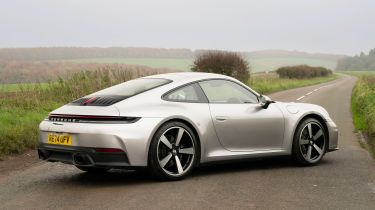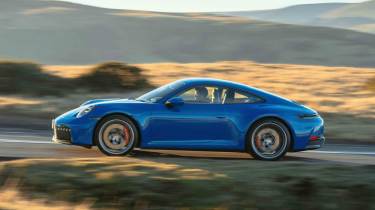Porsche 911 review - MPG, running costs & CO2
The new Porsche 911 isn’t cheap to run, but it compares favourably with its closest rivals
The Porsche 911 is the traditional benchmark for usability in the luxury sports car market and the latest iteration lives up to its reputation. Its claimed economy and emissions figures are better than most of its key rivals, and while servicing and consumables may be expensive, this is par for the course in the class.
The 911 is more efficient than the likes of the Aston Martin Vantage and Mercedes-AMG GT, while matching the BMW M4 CS with fuel economy figures in the top 20mpgs.
One thing that may surprise some buyers, though, is that even the entry-level Porsche 911 Carrera is now a £104k car before options have been added. Prices have been creeping up for a long time, of course, but anyone thinking a 911 is a sports car starting from around £60 or £70k is in for a shock. They’ll need to take a closer look at the Porsche 718 Cayman, which starts from a much more affordable £54k.
Porsche 911 MPG & CO2
Across the 911 line-up, the model designations are separated by ever higher power outputs, with the option of four-wheel drive while the latest generation of ‘GT’ monikered cars are the most hardcore. Unlike the 911s of old, turbocharging has now been adopted across every model in the line-up, making them more efficient than their predecessors.
More reviews
The entry-level 911 992.2 Carrera coupe is capable of up to 28mpg depending on specification, while emissions range from 229g/km to 239g/km. While it might get headline-grabbing hybrid technology, the 911 Carrera GTS manages slightly less at 27.2mpg and 236-247g/km of CO2. Not exactly a miss, though, when you consider these figures are barely any worse than the entry-level model, yet it’s a larger engine that boasts around 145bhp extra power.
Still, these are figures that put the 911 into the highest possible VED (road tax) and Benefit-in-Kind (BiK) brackets for company-car tax. If you need to slash bills here, it might be worth holding out for the forthcoming all-electric Porsche Boxster.
Stepping up to the pre-facelift flagship Turbo S, which is both the most powerful and thirstiest version of the 911, you can expect a fuel economy of up to 23.5mpg. Unsurprisingly, it also has the highest emissions of the standard range, emitting more than 270g/km of CO2. With its manual gearbox, the Sport Classic is even worse, managing 22.4mpg and 285g/km.
It may not have the most outright power but large wings and semi-slick tyres make the 911 GT3 thirsty, with official figures of up to 21.9mpg and CO2 emissions of just over 290g/km.
VED (tax) for all models is charged at the standard rate, plus a surcharge for years two to six of ownership owing to the 911’s high list price. First-year road tax is high, but rolled into the on-the-road price.
Insurance groups
The Porsche 911 Carrera S slots into group 50 – the highest insurance group possible. Most of the 911’s major rivals are also in this group.
Warranty
The Porsche 911 comes with a three-year unlimited-mileage warranty, a 12-year corrosion warranty and three-year paint warranty. The warranty can be extended if you’re willing to pay for it. The 911’s unlimited-mileage warranty is far better than the three-year, 60,000-mile offering that’s standard on the Audi R8.
Servicing
The Porsche 911 requires a service every 20,000 miles or two years, with shorter 12,000-mile intervals for GT models. However, even if you aren’t driving many miles, Porsche still recommends an optional annual check which can be “tailored to your requirements”, but can include checks on brake, clutch and tyre wear, along with ensuring fluid levels are correct and installing software updates.
Which Is Best?
Cheapest
- Name2dr PDK [4 Seat]
- Gearbox typeSemi-auto
- RRP£106,695
Most Economical
- NameGTS t-Hybrid 2dr PDK
- Gearbox typeSemi-auto
- RRP£140,875
Fastest
- NameGTS t-Hybrid 2dr PDK
- Gearbox typeSemi-auto
- RRP£140,875














